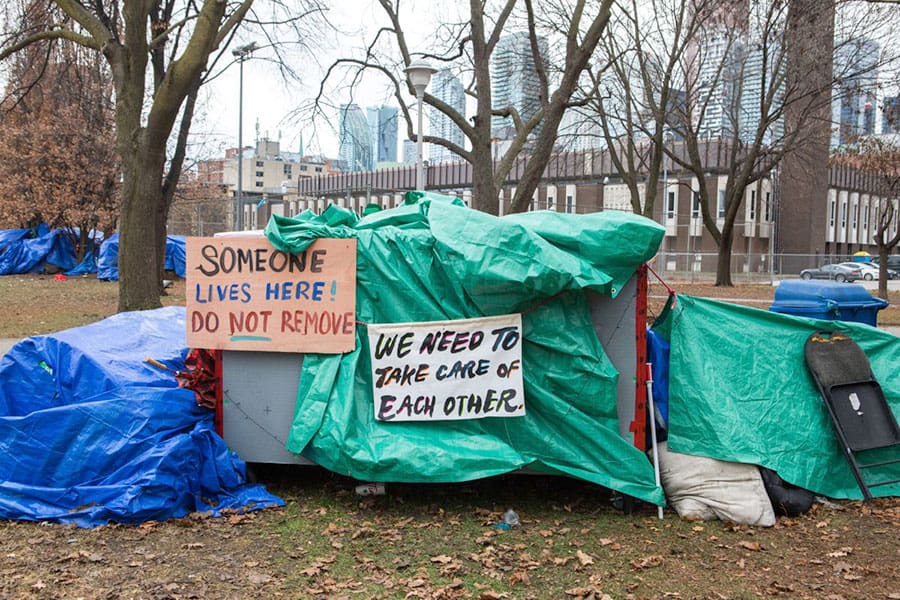Big City Mayors from Clarington to Burlington launch campaign to solve homelessness crisis
Published August 9, 2024 at 1:53 pm

Ontario’s Big City Mayors are hoping a united front can help solve a humanitarian crisis on Ontario’s streets.
With an unprecedented number of people homeless, living in encampments and other unsafe spaces and with many dying from addictions and mental health issues, the organization representing all Ontario communities with populations greater than 100,000 has launched the ‘Solve the Crisis’ campaign and has called on the Province to do more to solve the problem.
“Municipalities have done everything we can, but we don’t have the resources or expertise to take this on alone,” declared a news release from the lobby group, which is chaired by Burlington Mayor Marianne Meed Ward.
Over the last few years group has lobbied both upper levels of to address the crisis and Ward acknowledged Ottawa and Queen’s Park have taken some action, such as Ontario’s Roadmap to Wellness, the creation of the Homelessness Prevention Program and investments in youth wellness hubs.
But it’s just not enough, she said, adding that the issue spans multiple ministries, affects downtowns and public spaces across the province and hurts “our most vulnerable residents.”
“We need someone to take the lead and take action now.”
The Big City Mayors are asking the provincial government to help solve the crisis together by taking a few necessary steps:
- Appoint a responsible ministry with the appropriate funding and powers as a single point of contact to address the full spectrum of housing needs as well as mental health, addictions and wrap-around supports
- Strike a task force with broad sector representatives including municipalities, healthcare, first responders, community services, the business community and the tourism industry to develop a Made in Ontario Action Plan
- Provide municipalities with the tools and resources to transition those in encampments to more appropriate accommodations
- Commit to funding the services these individuals need, community by community where there are gaps in the system
- Invest in 24/7 Community Hubs / Crisis Centres to relieve pressure on emergency centres and first responders
“People are dying and something needs to be done,” said Ward. “The number of people who are unhoused, as well as those suffering with mental health and addictions issues, is growing at alarming rate, and municipalities cannot tackle this crisis alone. We need the province, along with all levels of government and community partners, to implement the programs that have proven to be effective. This cannot wait, we must work together to solve this crisis now.”

Burlington Mayor Marianne Meed Ward
Other mayors have chimed in with their support, including Clarington Mayor Adrian Foster.
“Clarington is committed to working with the Region of Durham and all levels of government to address the humanitarian crisis unfolding in our streets.”
Brampton’s mayor is calling on the province to do more for the residents of more than 1,000 homeless encampments in Ontario as the city is working with agencies to support the at-risk population.
“At last count there were over 1,400 encampments in Ontario, and that figure is only rising,” Brampton Mayor Patrick Brown said in a social media post on Thursday following the launch of Ontario Big City Mayors campaign.
London Mayor Josh Morgan, the Vice-Chair of Ontario Big City Mayors, also threw his support to the campaign. “I have witnessed firsthand the devastating impacts of homelessness and the urgent need for comprehensive solutions. Our city, like many others, has been working tirelessly to address this crisis, but we cannot do it alone. The ‘Solve the Crisis’ campaign is a crucial step in bringing together all levels of government and community partners to ensure that every Ontarian has access to safe, supportive housing and necessary mental health and addiction services. The only way we can solve this crisis is by working together.”
Canadian Mental Health Association (Ontario Division) CEO Camille Quenneville said their branches will be working with municipalities to support individuals facing mental health, addictions and housing-related issues. “Our hope is for increased investments to community mental health and addictions to support Ontarians in need.”
The Ontario BIA Association also offered support and it “stands with the Ontario Big City Mayors” is asking Queen’s Park to act. “Our main streets, our businesses and those living rough, are suffering and it is time for strong and positive action.”
While addressing the press after a conference call on the campaign, Ward said the system is in “desperate need” of an overhaul.
“As long as municipalities are required to wait for funding announcements, hope they qualify, hope that their applications will get across the finish line, wonder if they will get what they asked for — that is not a way to solve a crisis — any crisis, pick one. That is not how to run a country, that is not how run a province and it’s how we in Canada have been doing it for decades.”
Ontario’s Big City Mayors is an organization that includes mayors of 29 cities that represent nearly 70 percent of Ontario’s population.
To support the campaign, visit www.solvethecrisis.ca and contact your local MPP to tell them that you want the province to take action now. For more information, check out the YouTube channel at https://youtu.be/6VRjoEgQm98.
With files from Jake Pesaruk and Ryan Rumboldt
INdurham's Editorial Standards and Policies




